Interview: Anna Friel talks about her new transgender drama Butterfly
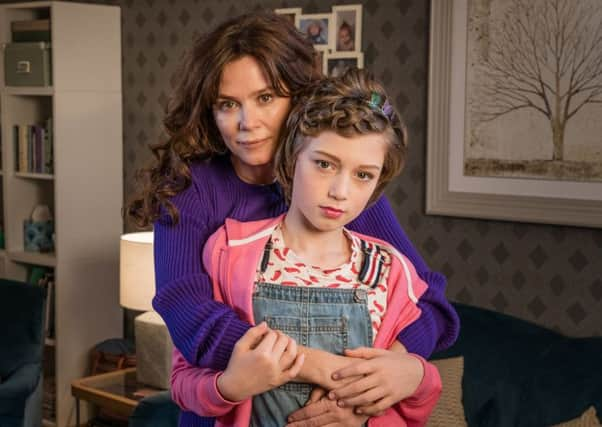

A kaleidoscope. In an antiques shop in York, Anna Friel chanced on one and had to have it. Ever since they were invented by David Brewer in 1817 people have been fascinated by lifting them to the light and watching the scraps of colour turn into endless patterns.
Brewer, a serious and slightly irascible (according to his daughter) Scottish scientist, was more interested in lighthouse optics, binocular cameras and the like and would probably be bemused that this invention was his most enduring. Yet he gave it the name, kaleidoscope, from the Ancient Greek, kalos (beautiful), eidos (form) and skopeō (to look at), so he would understand the attraction.
Advertisement
Hide Ad“It’s transitional, ever changing, beautiful,” says Friel, who suggested using kaleidoscope patterns to signal the ad breaks on her new ITV miniseries Butterfly. Written by Bafta winner Tony Marchant, it’s an exploration of how an ordinary family behaves when one of the children is transgender. Transitioning and evolving, the kaleidoscope visuals are the perfect metaphor for a timely exploration of transgender issues, the first in a drama on British primetime TV.
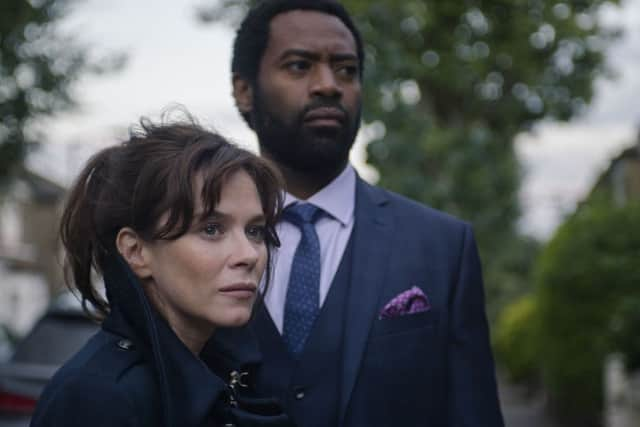

“The kaleidoscope is symbolic, colourful…” says Friel, then throws in a dose of down to earth practicality with, “and also a good way to break up the parts of the show.”
Multi-faceted is a term you might use of Friel herself, a shape shifter with a subtlety of approach that can capture the multi-dimensional complexities of a character or theme, whether it’s the complicated cop Marcella with her blackouts and mental health issues, US military maverick Odelle in Odyssey, or Vicky in Butterfly, a mother prepared to do anything to make her child happy. Butterfly director Anthony Byrne (Peaky Blinders and In Darkness) recognises this quality in Friel, describing the international, Emmy award-winning actor as “very instinctive” and “a maverick who is always searching for the truth of any moment.” He could also have added her long-standing attraction to roles that reflect the shifting patterns of the way we live now, our preoccupations and dilemmas, ever since she did the first pre-watershed lesbian kiss on TV in Brookside, as a teenager back in 1994. So how does the average family behave when they have a child who wants to transition? It was Friel’s acknowledgment that she didn’t know how she would react if it were her child Gracie, now 13, that made her want to do Butterfly.
“I certainly know a lot more about it now than when I went in,” she says.
Aiming to smash myths around gender transitioning – that it’s easily accessible, a choice, a phase, or that parents are forcing their child – Butterfly wants to normalise the experience of trans kids and their families, to inform us about gender dysphoria, and do it from the child’s point of view. Marchant is a writer drawn to the exploration of issues such as ADHD (Kid in the Corner), adoption (Bad Blood) and fertility (The Family Man) through the prism of a modern family. Produced by Nicola Shindler (Happy Valley, Last Tango in Halifax), as well as Friel, the cast includes Emmett J Scanlan as her estranged husband, Alison Steadman, Sean McGinley and child actors Callum Booth-Ford and Millie Gibson. Over three episodes we follow the family as Max expresses a desire to become Maxine and his parents are conflicted over how best to support their child.
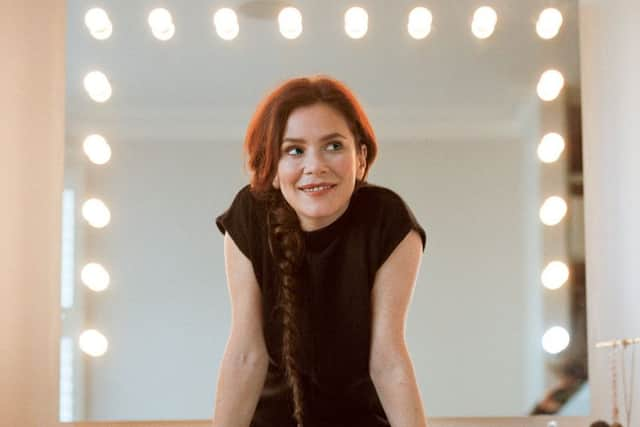

If all this sounds worthy, it isn’t. Butterfly has a light touch and humour, not least provided by Alison Steadman as a sharp-tongued ‘Nan’ happy to blame her daughter for the way her grandchild is “turning out”, in contrast to grandad Sean McGinley, and there are great performances from young actors Callum Booth-Ford as Max/Maxine and Millie Gibson as his older sister Lily.
Advertisement
Hide Ad“What did you think?” asks Friel, still chirpy in the middle of a day-long junket promoting the new series she co-produced. I tell her I thought it was compulsive viewing.
“Good. I think it’s really great. I’m really proud of it. Hopefully it’s funny, it’s relatable, it’s a really good drama about an important subject matter that I thought was really interesting. I think it really grows and grows on you.”
Advertisement
Hide AdFriel has never shied away from challenging roles and is happy to be putting the issue of gender dysphoria, the distress caused by a mismatch between biological sex and gender identity, on primetime. Besides, she fell in love with the family, the Duffys.
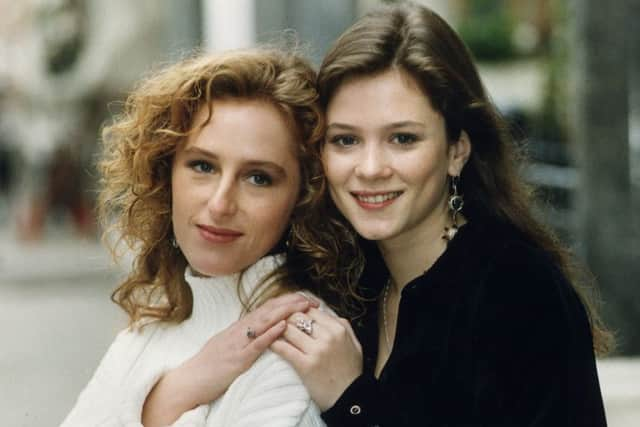

“It’s both exciting and frightening because of the responsibility that comes with it,” she says.“Maybe our views generally are a little bit old fashioned about this. When I did Brookside people were shouting lezza and dyke at me all the time and the Beth/Margaret storyline was hugely shocking, but not now. And in the same way, things that may be controversial now, let’s look at this in ten years’ time and see where we are.
“I don’t think we should seek out controversy for the sake of it but I’m drawn to stories that need to be told. And you have got to be strong and brave enough to tell everyone. This is a story that absolutely needs to be told. It’s at the front of people’s minds at the moment. What happens to a very normal family when you put them into extraordinary circumstances?”
“And I really just fell in love with that family. It’s such a believable, real, normal family, and brilliant child actors, they’re amazing. I adored the character of Max/Maxine, and identified with Vicky and her visceral love, that she would do anything for her child.”
As background the cast visited the Mermaids charity, which provides family and individual support for gender diverse and transgender children and young people. There they met young people and their families, some of whom became extras in the show in scenes when the fictional family visit a charity for support. Keen to be ethical about trans involvement, the showmakers decided not to cast a transitioned young actor in the central role as that would involve asking them to go back to their previous gender and be potentially psychologically damaging.
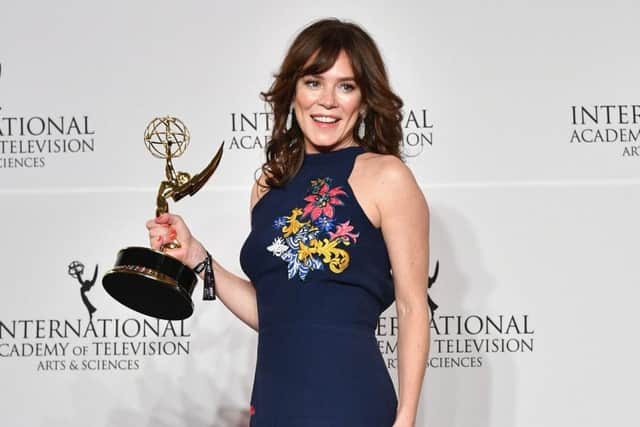

“We met so many beautiful people at Mermaids,” says Friel. “They gave me flowers and cards and said thank you for telling our story. One little girl just kept hugging me and she said, ‘God only worked half a day when he made me’. She was ten.”
Advertisement
Hide AdFriel is audibly moved by the experience that opened her eyes to the youngsters’ experience of prejudice.
“What shocked me was the cruelty they had suffered and it wasn’t other children, it was grown-ups. One child had had her nose broken by adults.”
Advertisement
Hide AdShe sighs, then reiterates, “Butterfly is not intended to be divisive, and hopefully it will help people be more open minded.”
Born in Rochdale in 1976, the child of a modern languages teacher/musician and a dance and drama teacher, Friel started acting when she was 13 at Oldham Theatre Workshop. Small parts in Coronation Street and Emmerdale followed before she joined Channel 4 soap Brookside as Beth Jordache at 16. As well attracting national attention for the first lesbian kiss, storylines that included sexual abuse and fratricide propelled Friel into the spotlight and her TV and film career took off, winning her awards – a National Television Award in 1995 and the Royal Television Society Award in 2009, plus a Golden Globe in 2008 for ABC comedy Pushing Daisies. For decades she’s been clocking up film appearances from David Leland’s The Land Girls in 1998, through Steve Coogan’s porn baron biopic The Look of Love, to last year’s Pierce Brosnan thriller I.T., while treading the boards in the West End and winning praise for 2009’s Breakfast at Tiffany’s and Chekhov’s Uncle Vanya with Ken Stott in 2012.
Most recently she’s carried off an international Emmy Award for Best Actress for the hit series Marcella, the ITV/Netflix crime drama written, directed and produced by The Bridge creator, Swedish screenwriter Hans Rosenfeldt. Starting in 2016, it was on our screens again this year, and Friel is about to pull on the trademark parka to film a third eight-part series which will air next year. In it she stars as Marcella, who has to struggle with a failed marriage, the tragic loss of a child, memory loss and blackouts. Then show up for her day job, catching killers.
“I’d be a liar if I said it didn’t have an effect on me,” says Friel. “I try my best not to let it but it’s an all-consuming role. You have to be her, to be authentic, to find the truth. Then when I finish filming, after a month or so of sleep and reading books, I’m all right again. I like to cook, and grow roses, that means a lot to me – I’m desperate for things to live.”
If Marcella takes it out of her with its dark story lines – and producers have plans to dig deeper into Marcella’s complex psychology in the next series – her other current project, Deep Water, is an altogether lighter affair. Filmed in the Lake District, it’s a six parter with three female leads, following their personal dramas. Adapted from Paula Daly’s Windermere series of novels, it’s about modern women struggling to keep their heads above water, with Friel playing a mother of three trying to run a business at the same time.
“I’m doing this because I like the script, the setting – it’s the Lake District – and it’s about three women whose lives intertwine, so there is chaotic juggling of motherhood and life. And also, my on-screen husband is Steven Cree I’m afraid,” she says with mock suffering at having to work alongside the Scottish Outlander actor.
Yeah that sounds like a tough gig.
Advertisement
Hide AdFriel laughs. She’s having fun, enjoying a change from a procedural like Marcella and being part of an ensemble cast. “I like that it’s more light hearted about life and it’s not all on my shoulders,” she says.
She’s also enjoyed having her family visit on set, much of the filming having been done on location. “I’ve just left them there, my daughter Gracie, my brother Michael and my sister-in-law and their six-month-old twins, and my mum and dad, the whole family. It’s been lovely.”
Advertisement
Hide AdDaughter Gracie, is Friel’s child with actor David Thewlis, with whom she had a nine-year relationship, the name inspired by another Rochdale star, Gracie Fields. “It was in the back of my mind because I’m from Rochdale too. And I like saying it. Gracie,” she says, her voice still Rochdale despite years in London and LA. These days Thewlis lives near Friel in Windsor and they co-parent teenager Gracie, an arrangement that works well and gives Friel an insight into today’s patchwork family dynamics.
“Yes, we are a patchwork family, half of it in Ireland, half here. We are a great family and we laugh a lot and find the funny side of life,” she says. “And I’m still like a little girl when it comes to my dad,” she says. Friel and her daughter are equally close and she’s big on family, always has been.
“I have an extraordinary relationship with my daughter and we are bonded in a very special way, as every mother is with her children,” she says, tapping into the empathy that makes her portrayal of Vicky so convincing.
With Butterfly, Friel is handing us a kaleidoscope, the chance to take our preconceptions of what it means to be male, female, a boy, a girl, look at them from a new perspective and appreciate all of the beautiful variations that result, because she wants us to know that Butterfly is not about them, it’s about us.
@JanetChristie2 #
Butterfly begins tomorrow on STV, 9pm; www.mermaidsuk.org.uk